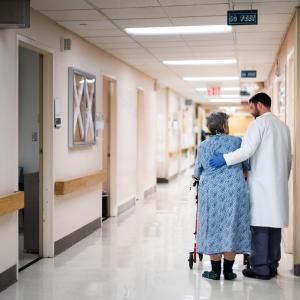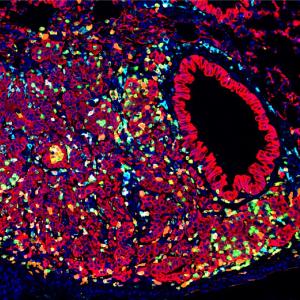
Photo: Sean Sime Photography
In late July, 24 first-year students at the NYU Long Island School of Medicine marked their journey to becoming doctors by receiving their medical coats in a White Coat Ceremony that was distinguished by its diversity. White Coat Ceremonies are a rite of passage, held the world over, that allow students to celebrate with family, friends, and faculty as they start their formal medical education.
The class of 2024 in the accelerated three-year primary care program is the most ethnically and racially diverse since the school opened in 2019: 33 percent of the class come from groups underrepresented in medicine; 15 students are women. The school, in Mineola, is situated on the campus of NYU Langone Hospital—Long Island.
Reaching Out to Underserved Communities
NYU Long Island School of Medicine’s initiatives to recruit medical students from underserved communities are making a difference. Several students are from underserved areas or are the first in their families to have attended college. The school is focused on training primary care physicians, and students will be studying internal and community medicine, pediatrics, general surgery, and obstetrics and gynecology.
A pledge from the NYU Long Island School of Medicine medical student oath states: “I will appreciate the complexity, diversity, and needs of each individual, and exercise empathy, compassion, and patience, to recognize biases, and treat all lives with equal dignity and respect.”
Andrew Hamilton, PhD, president of New York University, and Steven Shelov, MD, founding dean and chief academic officer at the school, greeted the students. Collin E. Brathwaite, MD, chair of the Department of Surgery and professor at NYU Long Island School of Medicine, gave a keynote address.
“You’re entering medical school amid this storm,” said Dr. Brathwaite, noting the disruptions weathered by the medical students during the pandemic. “You have the ability to influence the health of the population like no other class before you.” He also provided advice, “Always be compassionate to your patients. The care and compassion you show will help save their lives.”
Physicians Are a Mirror of Their Patients
Princeton University alumna Fernanda Fernandez, the first in her family to attend college, believes strongly in the importance of diversity among physicians. “It’s important that patients see themselves in us,” she says. “It will fortify the medical team if everyone has different strengths and perspectives.” Fernandez was inspired to become a doctor by her uncle, a general practitioner in Peru. “I want to be able to practice holistically and be at the forefront of medicine and preventive care,” she adds.
Bronx resident Emmanuella Kobara, a native of Togo, West Africa, decided to pursue a medical degree after recognizing the limited access to healthcare in that nation. “My goal is to change that and improve access to care,” she says. She also believes that diversity in medicine is important. “Patients need to know that their doctors can relate to them. Physicians also need to learn about the communities they serve so patients can feel comfortable. Cultural competence is important.”
Research shows that physicians from underrepresented communities often want to serve in those areas, according to Dr. Shelov. NYU Long Island School of Medicine’s diversity initiatives align with its mission to train primary care physicians who, it is hoped, will go on to care for local communities in the New York region, he added.
Media Inquiries
Anne Kazel
Phone: 516-493-2135
anne.kazel@nyulangone.org

